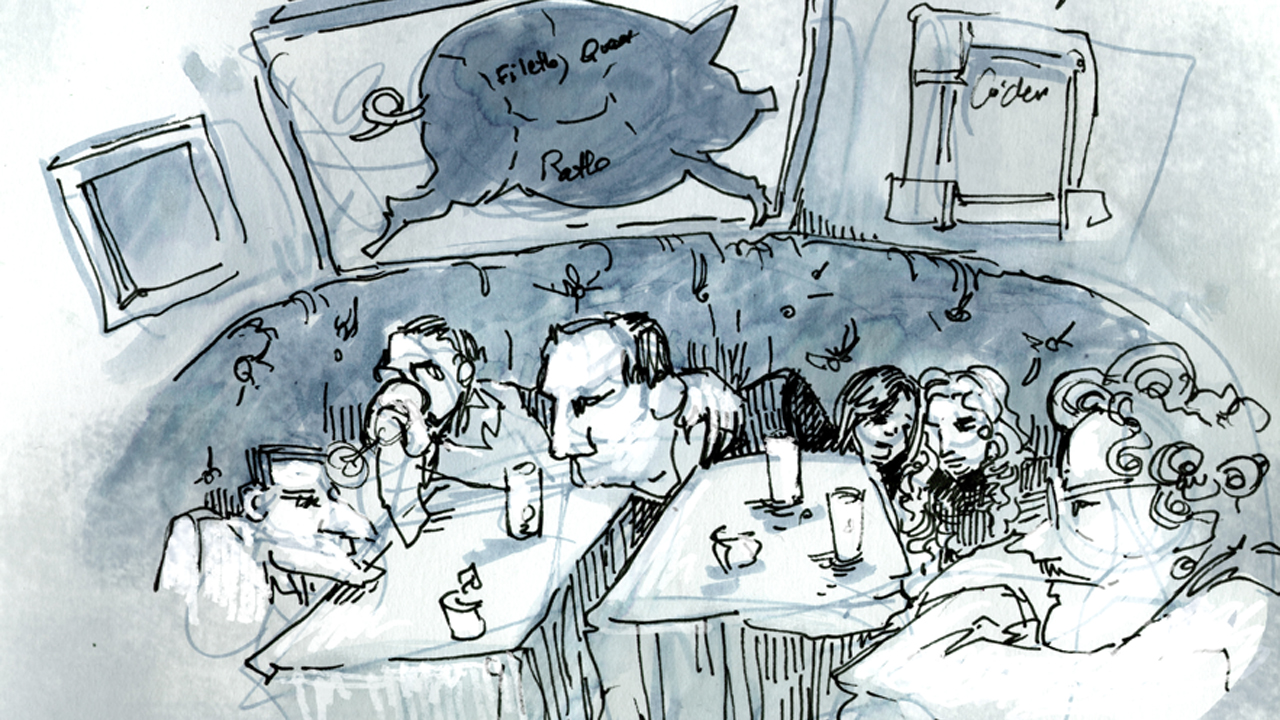Last week, Nadya Tolokonnikova and Masha Alyokhina, formerly of Pussy Riot, were the center of a cocktail party fundraiser for the VOICE project, an NGO that ran their legal fund. I say “center,” rather than “hosts.” Nadya and Masha smiled for the cameras, paid tribute to Russian political prisoners, then disappeared upstairs.

Their appearance lasted five minutes. After TV appearances and The New York Times, they must have been exhausted. I overheard them wanting a smoke.

The VOICE fundraiser was quintessentially New York — $300 a ticket, with guests packed bone to bone in the Spotted Pig, champagne and epic sliders. There was a bartender trying to pick up girls by saying they looked Russian. There were music industry execs, bouncers, and a VIP section open only to Marina Abramović, or those who could pay $1000 to get in. It was that whole siphon-money-out-of-rich-people dance that all effective activist organizations do, but not very punk rock.
Nadya and Masha were in this world but not of it.
The previous day, the remaining members of Pussy Riot had written an open letter parting ways with Nadya and Masha. Alternately cutting, sad, and respectful, the letter said that human rights activists could not be anarchist art criminals. It was the classic conflict of radical and reformist. Unlike so often in the left, they broke up without destroying each other.
Nadya and Masha spent most of the party in the VIP section with Nadya’s husband, Pyotr Verzilov. At 8:45, they paused on the step and repeat. Nadya’s mouth was like a bitten plum. I was the only person drawing in a crowd of cameras. Masha looked into my sketchbook and smiled, or at least I tell myself she did.
The journalists mobbed them. Art dealers held their phones angled high, just to steal an Instagram of their faces. The VOICE host, onstage, compared Pussy Riot to the soccer player, Pele, for the feelings that they all made him feel.

It’s so easy to skewer these parties, though the cash they raise underpins life-and-death activism. Without rich people benefits, groups like Amnesty International would never be able to save real human beings from jail.
But they have none of the feral beauty of Pussy Riot, or their predecessor Voina. This isn’t a place where people kiss police against their will or draw giant dicks across the street from the secret police.
There is nothing here transcendent here. There is nothing untamed. The celebrities and celebrity-worship, the objectification and mass-media-simplification — they may be necessary, but they had little to do with the brave, brilliant women who stood squinting in the camera flash. Neither has most of the media coverage following their release from jail.
“We start every interview abroad with the fact that people in Russia are being jailed politically for the May 6 case. And there have definitely been more than 50 interviews this week,” Masha wrote on her Facebook after the Amnesty International concert write-ups last week. “Then we see how afterwards, the subject of May 6 is consistently wiped out from the final texts and we decide to talk only about this case… And they don’t hear us… Not by any fault of their own, but because it’s our domestic political problem.” Yet, they keep trying. Even if they have to simplify.

“Masha’s and Nadya’s days will be filled with papers and stamps and fax machines as they seek to make incremental improvements in the lives of Russia’s growing number of political prisoners,” Miriam Elder wrote in her definitive post-jail profile. “It’s a thankless task, but one to which they’re committed.” They keep trying, even if it means appearing briefly and awkwardly at glitzy humanitarian functions.
“We don’t want to speak too long and draw too much attention to ourselves,” said Nadya and Masha, after stating that without their supporters, they’d be in jail, not standing on the Spotted Pig’s couch. They then urged the crowd to fight for Russia’s other political prisoners, so that they too could be “standing on that couch.”
(Illustrations: Molly Crabapple/ANIMALNewYork)


